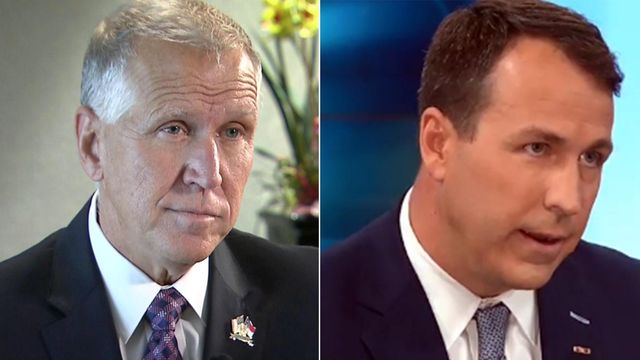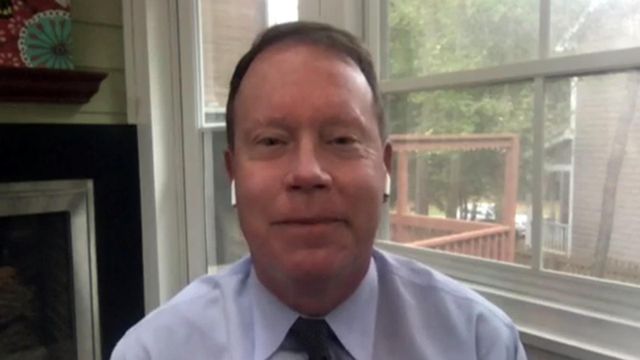Poll: Tillis gaining ground as Cunningham campaign stalls
With less than a week remaining in North Carolina's U.S. Senate election, Republican Sen. Thom Tillis still trails Democratic challenger Cal Cunningham but is making up ground rapidly, according to the results of a WRAL News poll released Wednesday.
Posted — UpdatedSurveyUSA polled 627 people statewide for the exclusive poll between last Friday and Monday who have either already voted or are likely to do so. The poll also found that voters have a high level of confidence in the election process in North Carolina. The poll responses have a credibility interval of +/-4.9 percentage points.
News of the affair appears to have moved some undecided women voters into Tillis' camp. Earlier in October, Cunningham held a 54-37 percent lead among women, but that has dwindled to 52-40 percent. Meanwhile, the incumbent has regained his lead among men, flipping Cunningham's earlier two-point lead to a 51-43 percent margin.
Tillis also has gained momentum among other demographics, while Cunningham's campaign appears stalled:
- Among voters under age 50, Tillis now trails 49-43 percent, down from a 20-point disadvantage two weeks ago.
- He has picked up 10 points among self-described moderates and now trails 61-30 percent.
- Tillis holds a 60-36 percent advantage among people who describe themselves as wealthy or upper middle class, flipping Cunningham's earlier 13-point lead. He also has drawn even with Cunningham among people who call themselves working class after trailing the challenger by 11 points.
- Although Cunningham continues to hold a sizable lead among suburban voters, Tillis has cut into his edge among city dwellers, shaving a 28-point disadvantage down to 12 points, while extending his own lead among rural voters, from six points two weeks ago to 18 points.
- Parents with children in school also switched allegiances, transforming Cunningham's eight-point lead into a 10-point margin for Tillis.
"Six days is not an insurmountable lead for Thom Tillis to overcome," Meredith College political science professor David McLennan said, noting 4 percent of voters polled remain undecided in the race.
Although a majority of respondents said Cunningham's refusal to answer questions about possible affairs doesn't affect the way they vote, 31 percent said it would make them much less likely to support him. Surprisingly, men were more likely than women to punish Cunningham for the issue, with 34 percent of men and only 28 percent of women saying they would be much less likely to support him.
Older and more conservative voters also said Cunningham's silence made them much less likely to support him, but the issue especially resonated among military households. Cunningham is an officer in the Army Reserve, which is now investigating his conduct. Fifty-six percent of people in military households said they are less likely to support him, compared with 42 percent in non-military households. Yet, Cunningham still holds a seven-point lead overall among military households.
McLennan said he doesn't feel the infidelity issue is driving the closer poll numbers. Rather, he said, it reflects how closely divided North Carolina is politically, noting that the WRAL poll also showed President Donald Trump and Democrat Joe Biden in a dead heat in the presidential race.
"As the top of the ticket goes, down-ballot races go," he said. "This is a seat that national Republicans have targeted and national Democrats have targeted."
Fewer voting on Election Day
Separately, the poll looked at people's confidence in the election this year.
Republicans, men, younger voters, rural residents and people who describe themselves as poor were more likely to say to they will vote on Election Day. But an increasing number of Republicans polled said they plan to vote early, which McCorkle said is good news for GOP candidates, given the uncertainty of the times.
"The idea of betting the farm on that last day, that real push of Republicans, that’s tough. What if it’s raining? What if the coronavirus numbers keep on going up?" he said.
Only 11 percent of voters expressed little or no confidence in the state's election system, while 43 percent expressed full confidence. Men, rural residents, college-educated people and the wealthiest voters were more likely than others to have full confidence in the process.
Meanwhile, people backing Trump were less likely than Biden supporters to have full confidence, 41-47 percent, respectively. Trump has repeatedly raised the specter of rampant election fraud and a rigged system, even saying that he might not accept the results if he loses.
Among political parties, the most skeptical group was independent voters, with 15 percent saying they have little or no confidence in the voting process, compared with 11 percent of Republicans and 10 percent of Democrats.
"Part of people choosing the independent or unaffiliated stance is probably some distance from the political process, some distrust or suspicion, not wanting to be connected with it or seeing it as either dirty or broken," McCorkle said.
• Credits
Copyright 2024 by Capitol Broadcasting Company. All rights reserved. This material may not be published, broadcast, rewritten or redistributed.






